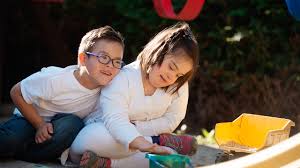It’s normal to feel distressed when you’re told that your child has a disability, but here’s some useful advice to help your child to reach their full potential.
As a parent, what can I do to support my child with a disability? Why is it important to focus on a child’s abilities?
Every child with a disability has strengths. These may be in doing artwork, in their personality, or in their motor skills. Every child has strength. It’s more important for us to focus on what children can do, their abilities, rather than their disability. We can use children’s abilities to assist the areas that they have most challenges with.
How can I communicate with my child with a disability and how do I know when he/she wants to communicate with me?
Some children with disabilities will be able to speak with you. Others will not be able to speak. But they do communicate, even though they don’t speak. For example, when a newborn baby comes into a family that baby communicates without speaking. You learn the baby’s likes and dislikes by whether they smile, or laugh, or whether they cry. The same occurs with children with disabilities who can’t speak. They tell you what they like by smiling or laughing, and they tell you what they don’t like by crying or making an upset face.
What can I do in my day-to-day to make sure I’m stimulating my child and his/her brain development?
Children are stimulated by everything in their environment: by the sounds, by the interactions, by your smile. So, if your child with a disability is around you, you should make sure that you spend time talking with them, explaining in simple language what it is you’re doing, smiling with them, telling them all about their environment, making noises around them so they can respond to noises.
Everything that you do, as you are moving about the house, as you are doing your housework, involve and include your child in it. Move your child into the room in which you are working. Tell them what you are doing: you are washing the dishes, you’re dipping the dishes in the water. Tell them exactly what you are doing. All of that will stimulate them.
You can also stimulate them by directly playing with them, by making little toys in the home, putting stones in a bottle and shaking it, by waving ribbons in front of their eyes, different coloured ribbons. There are many things that you can do with just things around your house.
Can I breastfeed my child if he/she has a disability?
Breastfeeding is really important for all children, but is especially important for children with disabilities. Breastfeeding is really important for children’s growth, children’s nutrition, and children’s brain development. Many children with disabilities are actually able to breastfeed, only a few are not able to breastfeed. And those who can’t, can be fed expressed breastmilk, because breastmilk is really the best.
Why are the early years of every child’s life so critical?
The early years of every child, whether they have a disability or not, are critical because when we stimulate the brain during these early years we are ensuring that the brain develops to its full potential. We are making sure that children have the best development that they can have and this happens for children with disabilities and children without disabilities.
How do I play with my child with a disability?
Children with disabilities enjoy being played with just like any other child. They enjoy you reading to them, showing them pictures, tickling them, hugging them, and cuddling them. They respond to you with laughter and smiling. If they don’t like a particular play that you are doing, they will tell you. They will stop laughing, they’ll stop smiling. Try something else. You will find something because you know them best.
If I don’t have time to play or money to afford toys, what can I do?
If you don’t have a lot of time to play with your child, there may be other family members in your home who will be able to play with your child with a disability. Brothers and sisters are really great around children with disabilities. They stimulate them because they talk to them a lot and they play with them. They don’t seem to be concerned about whether a sibling has a disability. They play with them just like anyone else.
What is your advice to parents who suspect that their child has a disability?
If you have a concern that your child has a disability, go to your nearest health provider and let them know your concerns. Some concerns may turn out not to be a problem at all, but some may, and your child may be identified as having a disability.
It’s just as important to provide children with disabilities with a loving environment. Children who are shown warmth and love grow up to be loving, warm persons. A child with a disability who is shown warmth and love will grow up to be an adult who may have a disability, but who is a wonderful person to be around.



